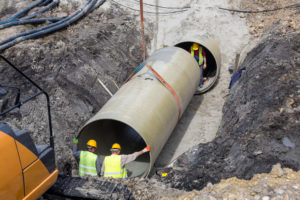
WASHINGTON, District of Columbia, United States – Amy Andryszak, President & CEO of INGAA, issued the following statement after the FERC 2023 New England Winter Gas-Electric Forum:
INGAA appreciates FERC convening today’s New England Winter Gas-Electric Forum, and the Commission’s recognition of the pending energy reliability crisis facing the region. The Forum reconfirms what we already knew – New England needs more natural gas to ensure energy reliability in the face of extreme weather events.
More than half of today’s discussion focused on the potential retirement of the Everett LNG facility, and the possible solutions to meet energy reliability in that scenario. The concerns raised by those advocating on behalf of Everett illustrate the inherent reliability benefits natural gas provides the region. The Forum would have benefitted from additional discussion about the role natural gas can play in promoting the reliability, affordability, and sustainability of the electric grid and the need to expand the existing pipeline system to accommodate alternative sources of imported LNG.
Chairman Phillips has repeatedly stated that reliability is “job number one,” and Jim Robb, President & CEO of the North American Electric Reliability Corporation, explained the role of natural gas in maintaining reliability well, stating: “The resource mix that we are moving towards here is full of all kinds of performance issues that we don’t yet understand. I am encouraged that there seems to be a slightly changed view about the importance of the natural gas system. The natural gas system up here is absolutely critical, and it needs to be reinforced.”
The New England states appear reluctant to acknowledge this reality because of a perceived conflict between natural gas and their ambitious climate goals. But even with a significant buildout of the electric grid and renewable energy infrastructure, New England inevitably will need natural gas to act as a fast-ramping backup in times when wind and solar resources cannot perform. And, without sufficient access to natural gas, ISO New England’s study shows that New England will rely heavily on coal and fuel oil to meet the region’s energy needs. This reliance undermines those stated climate goals.
Expanding pipeline infrastructure to carry low-cost gas from Marcellus and Utica remains the best solution to maintain reliability in New England and facilitate the region’s clean energy goals. Added capacity could also eliminate New England’s need to compete with other countries for LNG, further reducing prices and price volatility.
INGAA’s members work extensively with ISO New England to deliver critical natural gas to the generators needed to maintain electric reliability. As the electric grid operator explained, gas-electric coordination in the region is “second to none.” New England does not have a communication or transparency problem with pipelines; it has a problem with a lack of pipelines. Our members hope to work together with FERC, New England states, and ISO New England to permit and add expanded pipeline capacity in an environmentally responsible way in order to sustainably advance our shared reliability, security, and climate goals.
###
INGAA represents the U.S. natural gas pipeline industry. INGAA’s members deliver clean, abundant, affordable natural gas throughout North America and operate approximately 200,000 miles of pipelines that serve as an indispensable link between natural gas producers and consumers.







